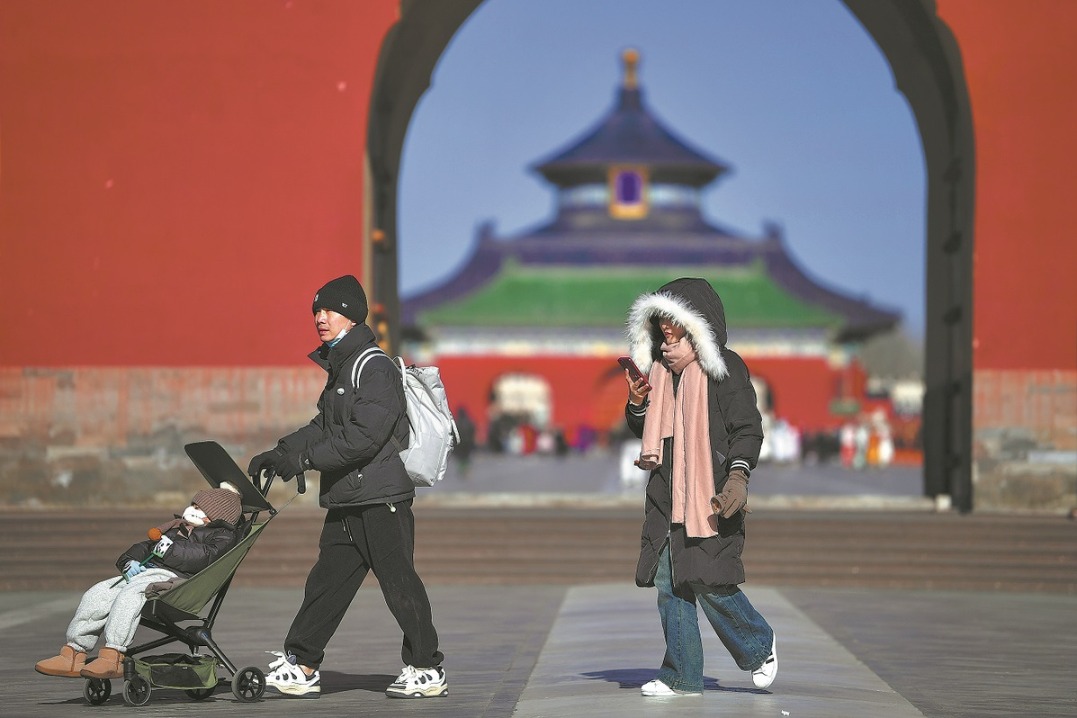China's Export Controls
China Daily | Updated: 2021-12-30 08:00
2. Building a Coordinated and Efficient Export Control Regime
Export controls involve multiple departments of the State Council and the CMC. China has established a sound working mechanism and clearly assigned roles and responsibilities among departments, which provides a solid institutional guarantee.
Regulatory system for export control of dual-use items.
.Export of nuclear dual-use items is regulated by the Ministry of Commerce jointly with the China Atomic Energy Authority;
.Export of dual-use biological items is regulated by the Ministry of Commerce jointly with the Ministry of Agriculture and Rural Affairs and the National Health Commission, among others as required;
.Export of dual-use items related to certain chemicals is regulated by the Ministry of Commerce;
.Export of dual-use missile-related items is regulated by the Ministry of Commerce jointly with the State Administration of Science, Technology and Industry for National Defense and the Equipment Development Department of the CMC, among others as required;
.Export of commercial cryptography is regulated by the Ministry of Commerce jointly with the State Cryptography Administration-the Cryptography Law stipulates that the export control list of commercial cryptography shall be formulated and published by the Ministry of Commerce in conjunction with the State Cryptography Administration and the General Administration of Customs;
.For the export of controlled chemicals, the Ministry of Industry and Information Technology regulates exporter accreditation jointly with the Ministry of Commerce, and is responsible for undertaking specific export review.
Regulatory system for export control of military products. The State Administration of Science, Technology and Industry for National Defense, and the Equipment Development Department of the CMC, regulate military exports in accordance with the division of their duties. This mainly includes reviewing the franchise qualification of military exports, export project proposals, projects and contracts for military exports, approving and issuing licenses for military exports, formulating rules regulating related business, supervising export activities, and punishing violations.
Regulatory system for export control of nuclear materials. The export of nuclear materials is regulated by the National Atomic Energy Authority and the Ministry of Commerce in cooperation with other departments. These exports are conducted by entities designated by the State Council. They are carried out in strict accordance with three principles-that nuclear materials should be exported for peaceful purposes only, that they should be under the supervision and safeguard of the International Atomic Energy Agency, and that they must not be transferred to third countries without the permission of the Chinese government. Competent authorities carry out rigorous reviews of nuclear exports and impose severe penalties on violators.
The General Administration of Customs cooperates closely with related authorities to regulate the export of controlled items. Among other duties it also engages in investigating and handling violations, carries out risk prevention and control, and supervises law enforcement.
III. Modernizing the Export Control System
China strictly enforces export control laws and regulations, and translates solemn commitments into concrete actions. With institutional foundations and technological support, China has gradually realized effective and comprehensive regulation and whole-process monitoring, and put in place a modern export control system providing scientific design, orderly operation and vigorous enforcement.
1. Improving License Management
China widely adopts internationally-accepted practices in export controls such as license management, end-user and end-use certificates, and general licensing. China has established an inter-agency consultation mechanism and a two-tiered management model, optimized the licensing procedure and extending the types of license. License management has been steadily improved, to ensure that all trade in export-controlled items is consistent with compliance requirements, and to create a better business environment for high-level opening up.
An inter-agency consultation mechanism for prudent and accurate review. For the review of dual-use items, China has set up an inter-agency consultation mechanism that brings together the Ministry of Commerce, the Ministry of Foreign Affairs, the Ministry of Industry and Information Technology, the State Administration of Science, Technology and Industry for National Defense, China Atomic Energy Authority, and the Equipment Development Department of the CMC. These departments work closely together to review export applications, each carrying out its respective duties, taking into account factors such as national security and national interests, international obligations, end users and end uses, to ensure compliance with applicable laws and policies.
A two-tiered management model to facilitate license applications. License applicants may come from any part of China. To strike a balance between export promotion and export control, and to protect and promote trade in controlled items that is consistent with compliance requirements, China adopts a two-tiered license management model. Provincial government departments are mandated to provide exporters with public export control services and re-submit their export applications to the central government. The results of reviews are sent to the exporters and China Customs via the internet. To facilitate trade, the Ministry of Commerce realized paperless license management for dual-use items in July 2021, employing digital tools through the entire process of application, review, license issuance and customs clearance. As a result, the licensing time frame was shortened by five to seven days.
Improved measures for targeted license management. China promotes multi-tiered management with the emphasis on end-user and end-use certificates. Generally, an exporter is required to submit the end-use certificate provided by the end user; for export applications presenting a potential risk, the exporter is required to submit end-user and end-use certificates verified or issued by the government agencies of the country or region in which the end user is located, and by the Chinese embassy or consulate in that country or region. To extend the types of license, China grants general licenses to exporters with internal compliance programs and sound operating procedures, provided that they meet the necessary requirements. These general licenses allow them to export multiple times to multiple countries/regions or end users within the period of validity. The implementation of these measures has made license management more targeted and effective.
An expert team for informed and efficient management. China values the contribution of experts, and has created statutory provisions to establish and improve the export control expert advisory mechanism. Relevant departments have set up a team consisting of experts in dual-use items, military products, nuclear materials, and other areas, to facilitate informed and accurate assessment. Over the years, the expert team has provided robust support in the creation of lists, license management, monitoring and enforcement, and business consultancy. As export control becomes a more specialized field, China will continue to mobilize more experts to develop a team providing wide coverage and strong expertise, so as to provide more professional and effective support in the new era.
2. Strengthening Enforcement Capability
China continues to reinforce its export control enforcement mechanism by expanding methods and sharpening capabilities. An authoritative and efficient system has gradually taken shape with consistent rights and responsibilities, which plays an important role in tackling violations and ensuring complete, accurate and strict implementation of relevant laws and regulations.
Improved organizational structure for a coordinated and effective enforcement mechanism. In 2014, to strengthen institutions responsible for export control, the Ministry of Commerce set up a dedicated enforcement team, which is responsible for developing enforcement institutions and conducting case investigations. The Ministry of Commerce, the Ministry of Public Security, the Ministry of Industry and Information Technology, the General Administration of Customs, and other departments have strengthened collaboration on enforcement, and work on joint enforcement with relevant departments of provincial governments. With this horizontal and vertical cooperation among central departments and provincial governments, a closely-knit enforcement network is in place. It provides a firm institutional guarantee for enforcement of export control laws in China and effectively addresses the problems posed by geographical distance, wide spectrum, and difficulties in imposing penalties.
Various enforcement measures to amplify the deterrent effect of enforcement and regulation. China continues to strengthen its enforcement capability. In addition to basic methods such as site visits, inquiries and investigations, and access to materials, the enforcement authorities are also authorized to employ other methods, including sealing off and detaining items and checking bank accounts. The enforcement authorities can also mark any illegal act into the credit record of an offender, which significantly reinforces the deterrent effect of law enforcement. Every aspect of the export process is covered by enforcement. In addition to the exporters, intermediary service providers are also subject to control to prevent illegal exports. Agencies and individuals are prohibited from providing offenders with intermediary services such as agency, shipping, consignment, financing, customs declaration, and third-party e-commerce platform transactions. China also values the role of non-compulsory enforcement methods such as regulatory interviews and administrative guidance, and implements preventive, guiding, and monitoring measures to ensure that enforcement is effective.
Improved enforcement equipment and IT application to strengthen guarantees. China has increased inputs into enforcement equipment. With professional equipment to detect radioactive, biological and chemical items, China Customs is able to inspect and detect illegal exports more efficiently, thus helping enforcers to dispose of controlled items more effectively. China has also improved the use of enforcement information by sharing information among enforcement and regulatory agencies. China attaches great importance to collecting information and analyzing statistics on violations. Basic information on companies involved is integrated with case descriptions through use of information technologies. To boost enforcement capacity, the enforcement authorities regularly provide enforcers with training on export control laws and regulations, and on identification and enforcement skills.
























